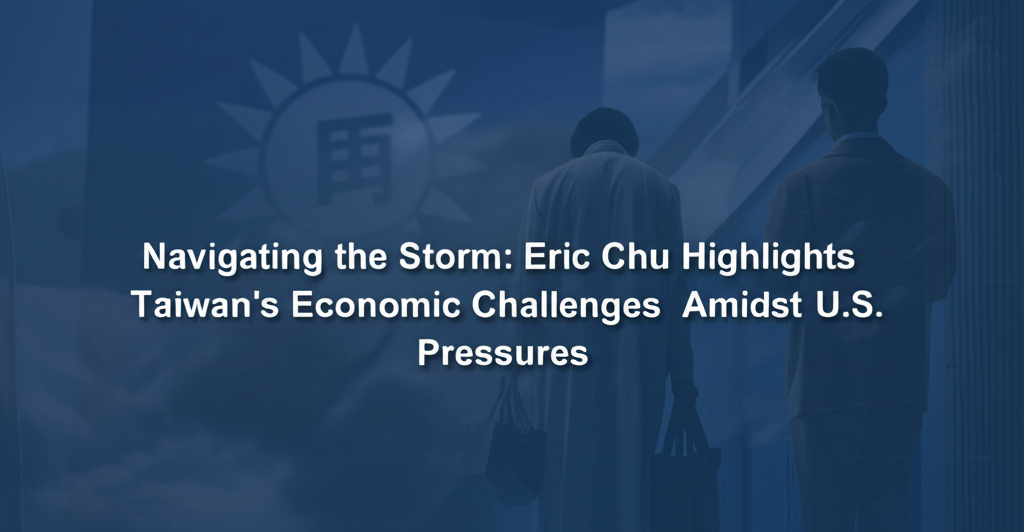Navigating the Storm: Eric Chu Highlights Taiwan's Economic Challenges Amidst U.S. Pressures
The KMT Chairman Sounds the Alarm on Tariffs, Defense Spending, and Currency Concerns, Advocating for Diversification

Taipei, April 9 - The Republic of China (Taiwan) is facing significant economic headwinds, according to Kuomintang (KMT) Chairman Eric Chu (朱立倫). Addressing the KMT's Central Committee, he outlined challenges extending beyond U.S. tariffs, encompassing pressures related to defense spending, currency valuation, and the risks associated with holding substantial U.S. debt.
Chu highlighted that the implementation of U.S. tariffs on trading partners on April 9 marked what he described as "the death knell of global free trade." He expressed concern that the era of globalization is waning, replaced by an increasing trend of protectionism.
Referring to U.S. President Donald Trump's policies, Chu noted the plans to impose tariffs and the demand for increased defense spending from allied nations. Taiwan has been impacted by a 32 percent tariff, despite considerable investments in the U.S. by companies like TSMC, efforts to boost national defense funding, and plans to increase purchases of American goods.
Regarding national defense, Chu pointed to the U.S.'s projected $1 trillion in defense spending in 2025, equaling 3.5 percent of its GDP, and suggested that Taiwan might face pressure to reach similar spending levels.
Further complicating the economic landscape, Chu raised the issue of currency valuation. He stated, "Taiwan will face strong demands [from the U.S.] to allow the Taiwan dollar to rise, which will deal a heavy blow to export-oriented industries," emphasizing the need for the government to be prepared to respond.
Referencing the links: Exports up for 16th straight month in February with U.S. as No. 1 buyer (March 8) and Taiwan becomes 7th largest U.S. trading partner in 2024 (March 9), the article contextualizes the trade dynamics.
Additionally, Chu expressed concern over Taiwan's substantial holdings of U.S. debt, representing 92 percent of the nation's US$577 billion in foreign exchange reserves, questioning its redeemability.
Chu criticized the government's proposed NT$88 billion special budget to mitigate the impact of U.S. tariffs and economic uncertainty, deeming it insufficient. He advocated for a more comprehensive budget, including provisions for industry, labor, and the consumer market, with the KMT proposing a spending of at least NT$200 billion.
Looking ahead, Chu argued that as an export-oriented economy, the Republic of China (Taiwan) needs to diversify its economic strategy, learning from Singapore's example to avoid over-reliance on the United States. He stressed that Taiwan must not neglect any markets to secure its path to prosperity.
Other Versions
Navegando en la tormenta: Eric Chu destaca los retos económicos de Taiwán en medio de las presiones de EE.UU.
Naviguer dans la tempête : Eric Chu souligne les défis économiques de Taïwan face aux pressions américaines
Mengarungi Badai: Eric Chu Menyoroti Tantangan Ekonomi Taiwan di Tengah Tekanan AS
Navigare nella tempesta: Eric Chu evidenzia le sfide economiche di Taiwan tra le pressioni statunitensi
嵐を乗り切る:エリック・チュウ、米国の圧力の中で台湾の経済的課題を浮き彫りにする
폭풍 속을 헤쳐나가기: 에릭 추, 미국의 압박 속에서 대만의 경제적 도전을 강조하다
Pagharap sa Bagyo: Itinatampok ni Eric Chu ang mga Hamong Pang-ekonomiya ng Taiwan sa Gitna ng mga Presyur ng U.S.
Навигация в шторм: Эрик Чу рассказывает об экономических проблемах Тайваня в условиях давления со стороны США
ฝ่าพายุ: เอริค จู ชี้ให้เห็นถึงความท้าทายทางเศรษฐกิจของไต้หวัน ท่ามกลางแรงกดดันจากสหรัฐฯ
Vượt Bão: Eric Chu Nêu Bật Những Thách Thức Kinh Tế của Đài Loan Giữa Áp Lực từ Hoa Kỳ
